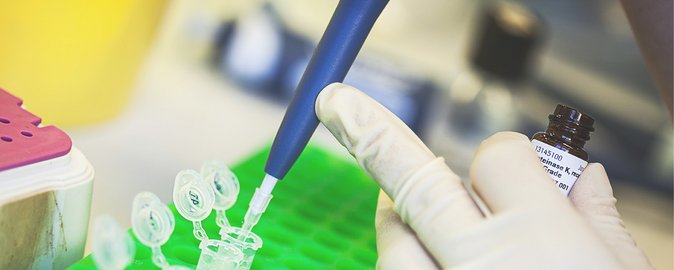- Education
-
Research
Current research
Talent
-
Collaboration
Businesses
Government agencies and institutions
Alumni
-
About AU
Organisation
Job at AU
The research year will be preserved with the help of alterations including the final report with internal co-examination being replaced by an individually agreed completion of the project. The administrative adjustments mean that the popular scheme will now continue without the previously announced cutbacks in numbers.
2019.02.08 |

The graduate school at Health has a new model for the research year ready and it will now be possible to continue the scheme without the previously announced cutbacks. Photo: Jesper Rais, AU Communication.
In recent years, the study progress reform has led to uncertainty about the future of the research year. The problem has been that the leave taken by students to carry out research is considered to be an extension of the prescribed time to degree – and that is something which costs the faculty a lot of money. The graduate school is now ready with a new model which keeps the research year as an option for the faculty's potential junior researchers.
The model involves the discontinuation of the twenty-five-page final report with oral defence and an internal assessment. Instead, students will agree how the project should be completed together with their coming supervisor as part of the application process. This could e.g. be done with an oral presentation or article. The new model gives the supervisor greater responsibility for ensuring that the project has the required academic weight and scope.
The Society for Medical Student Research – which represents AU’s medical students in research matters – regrets that the report is being discontinued but can also see positive aspects in the new scheme: “From our side, we strongly encourage that the research year is completed with for example lead authorship of an article and an oral presentation for the research group. Whether you receive a formal assessment with internal co-examination is less important. But students ought to finish with a product, so things don’t simply end up with them as sixth author of an article that’s first published long after their research year ends,” says vice-chair in the Society for Medical Student Research, Cecilie Blenstrup Patsche, who herself completed her research year in 2015.
The society is generally pleased to see the research year continue at Health as a possibility for student research. The vice-chair adds that the new model actually offers greater flexibility for those students who take a research year early in their degree programme, as they now have the opportunity to use the material from the research year in their Master’s thesis. Previously, this was only possible if a research year was completed at the end of a Master’s degree programme.
Two annual rounds of applications to the research year are maintained and the new model will already come into force from the 2019 spring admissions. Individual applications are assessed by the managers of the relevant PhD programme in association with a recruitment committee. Assessments are based on the scope of the project, the applicant’s qualifications and the research environment in question. The most suitable applicants are then offered the opportunity of taking a research year.
Students previously received a diploma signed by the dean and vice-dean as documentation for a completed research year. This is also altered in the new model in which the diploma is replaced by a certification of passing which resembles an ordinary exam grade. The Society for Medical Student Research does not think that the diploma is important.
“What really has value is that the student gets a statement from his or her supervisor. We strongly urge that this is the case. The diploma is a fine gesture but it’s not important later on in your career,” adds Cecilie Blenstrup Patsche.
Division Manager, HE PhD Administration Damian A. Hertoft Goldberg
Email: damian@au.dk
Telephone: (+45) 9350 8910